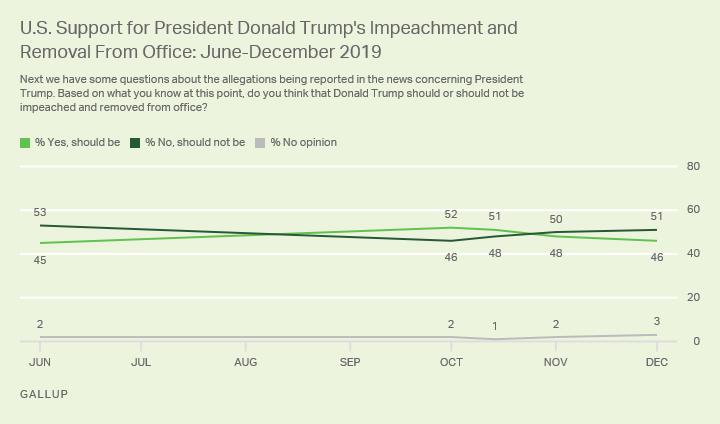President Donald J. Trump, 45th head of state, is now the third President since 1776 to be impeached by the House of Representatives of the United States.
The next step is a trial to be held in the U.S. Senate, and a vote that will determine acquittal or removal from office.
Will impeachment or the economy decide the next election?
President Trump’s impeachment articles were approved by the House of Representatives and now go to the Senate, where a trial will be held soon.
The outcome in the Senate is likely to be acquittal, as the hurdle for conviction is high. Removal from office requires a two-thirds majority of the 100-member Senate. There are only 45 Democrat senators and two independents, so reaching 67 votes to remove President Trump is unlikely, as about 20 Republicans would have to vote to convict. Unless there are new and very damaging revelations about Trump’s conduct that hurt his approval rating, acquittal is almost certain.
In 1998 President William Clinton was the second president impeached over an affair with an intern and a sexual harassment charge. Clinton was accused of perjury in testimony to a grand jury and obstruction of justice. His impeachment commenced on December 19, 1998 and the Senate voted for acquittal on February 12, 1999.
One important difference between the Clinton and Trump impeachments is the election cycle. In 1998 Clinton was starting the last year of his second term and therefore not running for office, while Trump is in the early stages of the 2020 election cycle and hoping to win re-election to a second term.
The first instance of impeachment occurred in 1868 when Andrew Johnson, the 17th president, was charged with eleven articles of impeachment. In that case, Johnson was not removed from office since the required 2/3 majority was not reached, although the attempt to convict failed by only a single vote. President Johnson precipitated his impeachment by his decision to fire the Secretary of War without Congressional approval.
The charges against President Trump seem more serious than those in the two previous impeachments. The first article alleges abuse of power for soliciting foreign interference in elections and the second accuses him of obstructing Congress by blocking testimony.
Trump’s approval rating inched up this week as Democrats prepared to launch their impeachment. According to Gallup, 45 percent of those polled approved of the President’s overall performance. When asked about impeachment 46 percent of those polled agreed with impeachment, down from a high of 52 percent in October 2019. Only 5 percent of Republicans agree with impeachment while 85 percent of Democrats want Trump removed from office.

Source: Gallup
In 1998, the House of Representatives was controlled by Republicans who decided to impeach President Clinton, despite polls that consistently showed fewer than 40 percent agreed with impeachment. President Clinton’s approval rating soared after impeachment was announced, to more than 70 percent.
As discussed in a recent weekend note, President Trump’s re-election depends more on the continuation of a strong economy and stock market than impeachment
Trump’s overall approval rating is lower than average for an incumbent president seeking a second term, but he does get high approval ratings on economic issues. His approval on the economy has improved from 49 percent in early December to almost 54 percent:

Source: Real Clear Politics
If the stock market continues to hit new highs, and the U.S. economy doesn’t slide into recession, it’s likely that impeachment will not derail President Trump’s chances for a second term. As President Clinton’s chief strategist, James Carville, said during the 1992 election, “It’s the economy, stupid.”
Hilliard MacBeth
The opinions expressed in this report are the opinions of the author and readers should not assume they reflect the opinions or recommendations of Richardson GMP Limited or its affiliates. Assumptions, opinions and estimates constitute the author's judgment as of the date of this material and are subject to change without notice. We do not warrant the completeness or accuracy of this material, and it should not be relied upon as such. Before acting on any recommendation, you should consider whether it is suitable for your particular circumstances and, if necessary, seek professional advice. Past performance is not indicative of future results. The comments contained herein are general in nature and are not intended to be, nor should be construed to be, legal or tax advice to any particular individual. Accordingly, individuals should consult their own legal or tax advisors for advice with respect to the tax consequences to them, having regard to their own particular circumstances.. Richardson GMP Limited is a member of Canadian Investor Protection Fund. Richardson and GMP are registered trademarks of their respective owners used under license by Richardson GMP Limited.